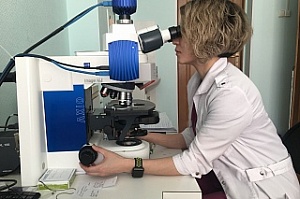Scientists at TSU and the Research Institute of Cardiology are studying the immune system response that can provoke heart failure after myocardial infarction. They are developing a new methodology for assessing the immune inflammation in the heart that would allow identifying in time the patients who need additional treatment and observation.
Thanks to developments in medicine, the survival of patients after myocardial infarction has increased, but at the same time, the number of those with postinfarction heart failure also has increased. It is a very serious disease, which affects all the human organs, and the prospects for treatment are often limited. Therefore, scientists set themselves the task of predicting the complications of the infarct and managing them at an early stage.
The contribution of the immune system during myocardial infarction and its complications has been studied at the TSU Laboratory for Translational Cellular and Molecular Biomedicine and the Research Institute of Cardiology for several years. Scientific leaders of the project are Professor Julia Kzhyshkovska (Heidelberg University), the head of the laboratory, and Vyacheslav Ryabov, the deputy director of the Research Institute of Cardiology.
- Today, one-third of patients who have had a heart attack, even if they are provided with qualified help in time, had also heart failure, and no one knows why, - says Alexandra Gombozhapova, a member of the project. -We assume that this is because the inflammatory phases in these patients do not change in time: either the inflammation does not start or it lasts too long, and this breaks the process of healing the heart.
According to Alexandra, there is no method for assessing the inflammatory process directly in the heart after a heart attack. Scientists at TSU and the Institute of Cardiology plan to find specific biomarkers for this process, and their combinations in immune cells, macrophages. To do this, they examine the heart tissue of patients who died from myocardial infarction and its complications, and with the help of biomarkers assess the presence and the number of different types of macrophages, so that the nature of the inflammation can be assessed.
-In the project, we plan to consider the behavior of six biomarkers in 40-60 patients, - says Alexandra Gombozhapova. - As a result, we plan to create diagnostic panels from biomarkers and their combinations, which in the future will allow specialists to make analyses quickly, to timely identify a risk group among patients, and to prevent the development of dangerous complications, in particular heart failure.
Based on the results of the project, it is planned to patent the diagnostic method. In the future, according to the results of the study, scientists do not exclude the possibility of not only determining the nature of inflammation in the heart but also studying macrophages as therapeutic targets.

